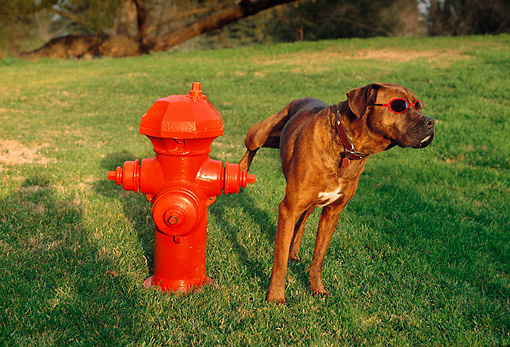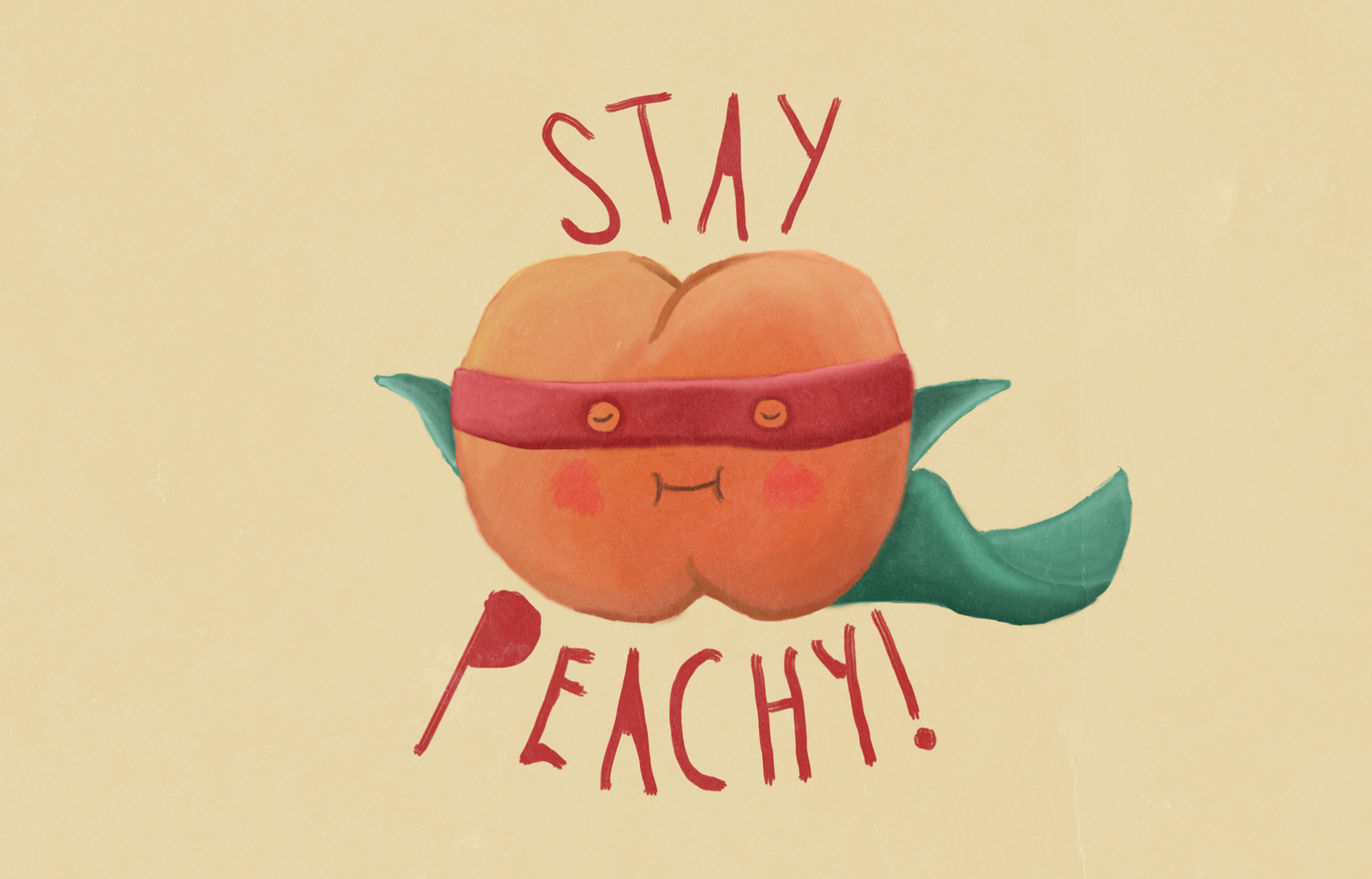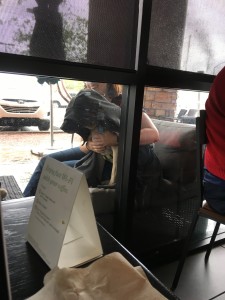I’m sitting here at a very crowded Starbucks trying to evoke some sort of color muse/inspiration/ creative surge… To no avail. I am about to take a break from my writer’s block when suddenly the door opens, a strong breeze pervades the café, and I catch a tantalizing sniff of the “Peach Tranquility” tea I am sipping that is fortified with loads of honey. Then it hits me: “What is that haunting aroma?”[1] Peach! I will write about peach! But what, exactly, will I say about peach?[2]
Peach: The first thing that comes to mind is the commonly used phrase, “Georgia peach,” the definition of which my good friend Jessie Kerins wholly epitomizes—she’s a real Southern doll. However, if I were to take a step back and think about the reasoning behind that… Specifically, if someone were to see me walking down the street[3] and say—“Hey! You’re a real peach!”—I would be wholly concerned. You think I’m a what? I do not look like this!
That got me thinking: What does this even mean? Why this saying? Why a peach? So I did a little research… Which made me realize just how many fruit-derived expressions and idioms the English language has in general… Which made me hungry[4]… Which made me curious about where the English language’s “expression obsession” comes from in the first place…
English has, perhaps, more idioms than any other language. What is an idiom, you may ask? Well, seeing as I am an English teacher, you’ve come to the right place! An idiom is a group of words established by usage as having a meaning not deducible from those of the individual words[5]. Huh? In other words, an idiom is a commonly used expression whose meaning does not relate to the literal meaning of the words. It’s “raining cats and dogs” and he has a “chip on his shoulder” are common examples. Notably, an English language learner would hear these expressions and be greatly confused, picturing the following scenes:
…And with due cause! Why should “raining cats and dogs” naturally connote a great deal of torrential downpour? What do cats and dogs have to do with rain? Wouldn’t it hurt tremendously to have loads of cats and dogs pelt your umbrella on a rainy day?[6]
Similarly, why shouldn’t having “a chip on your shoulder” mean that you are an extremely messy eater who needs to close out of Netflix, get off the couch, and put the chips down before you bury yourself alive in leftover food particles![7] Utilizing the true meaning of this phrase, instead, of a chip that you are holding on to as a future snack[8]— you know, just in case—, you are holding onto a grudge. Way less interesting.
Along these lines, I can’t help but channel all things Amelia Bedelia, the lovable protagonist of a series of illustrated children’s books written by Peggy Parish. Notably, the stories chronicle Amelia repeatedly misunderstanding various commands by habitually taking myriad figures of speech and terminology quite literally, causing her to comically botch the required actions. Needless to say, good-natured humor and chaos are never far away from the literalism that is Bedelia.
Admittedly, it has been a while since I have indulged in one of Ms. Bedelia’s rib-tickling[9] literal escapades, so I relied on a fancy little thing called Google to refresh my memory with several fantastic examples of her humorous behavior[10]:
1. In the first Amelia Bedelia book, which is self-titled, Amelia’s employers leave her a list of household chores. This includes the request to “dust the furniture.” She locates the dusting powder and carefully spreads it over all the furniture in the house. I see no problem there: Sounds pretty self-explanatory to me!
2. In the same book, Amelia is told to “Draw the drapes.” Sounds like a box of 120 Crayola crayons is in order! What’s a girl to do but get out her sketchpad and doodle a quick rendition of the curtains?
3. In Merry Christmas, Amelia Bedelia, Amelia is making cakes and pies for the family to eat. A date cake is included as one of the requested varieties. You know, like a cake made of dates. After a moment of pondering where to get dates on such short notice, Amelia finds a calendar, clips out all of the dates and dumps them into her cake batter. Yummy!
4. It doesn’t take much imagination to figure out what Ms. Bedelia did when she was told to “steal home plate” in Play Ball, Amelia Bedelia. Theft is serious, but this is so worth going to jail.
5. What would we do in a world where all instructions were literal? While working in a doctor’s office, one patient calls to report she has “caught a bug,” Amelia’s sound advice is to “let it go,” of course. Um, duh.
And, while Amelia is certainly a hoot, her actions are not wholly unjustified. How is one supposed to keep track of the numerous inconstancies and eccentricities of the English language? Notably, I can recall several stories Mom has recorded from our childhood where we could have easily starred in our own children’s book series as comically literal characters.
Indeed, as legend has it, once Mom, Ryan, and I were at a stoplight in our minivan next to another, Scooby Doo-like van. In all my childhood wisdom, I inquired, pointing out the window: “Mom, if you drive a Minnie van, does that make this a Mickey van?” Slow clap: Go mini Katie! Disney, how have you not capitalized on this? You can thank me later.
Similarly, there is lore that once Ryan was sick with a cold and fever—the works—and my mom, concerned, wanted to take his temperature to make sure he wasn’t “running a fever.” Telling him as much, she readied the thermometer when sage little Ryan, wanting to appease his worried mother, responded: “Mom, I don’t think I’m running a fever. I just think I am walking one.” Touché: The kid had a point. What is this language that we speak?!
Honestly, where do these idioms come from? And how are we to ready ourselves against Amelia Bedilia-esque behavior that could inherently cause us to take “literal” to a whole new level[11]? Again, doing a bit of casual research, I selected several idioms with histories that particularly strike my fancy[12] and are definitely worth illuminating:
“Get a leg up”
-What Amelia would think:
-Definition: To get a boost or advantage
-Origin: “Getting a leg up” is from the act of an equestrian receiving help in mounting a horse. The helper would create a foothold by cupping the hands to heft the rider upward, throwing a leg up and over the steed.
“Jump on the bandwagon”
-What Amelia would think:
-Definition: To do what everyone else is doing; to do what’s popular
-Origin: Old time political campaigns would attempt to gain supporters with what amounted to a small parade including a band for a candidate with sufficient support. Jumping on the bandwagon was akin to providing your support for this popular candidate.
“Kiss of death”
-What Amelia would think:
-Definition: Something that signifies/leads to failure
-Origin: From the fabled Mafia practice. A kiss from the Don meant curtains (death) for the receiver.
“Let the cat out of the bag”
-What Amelia would think:
-Definition: To divulge a secret
-Origin: At medieval markets, unscrupulous traders would display a pig for sale. However, the pig was always given to the customer in a bag, with strict instructions not to open the bag until they were some way away. The trader would hand the customer a bag containing something that wriggled, and it was only later that the buyer would find he’d been conned when he opened the bag to reveal that it contained a cat, not a pig. Therefore, “letting the cat out of the bag” revealed the secret of the con trick.
“Blow off some steam”
-What Amelia would think:
-Definition: To enjoy oneself apart from responsibilities; to relax
-Origin: Boilers are commonly used in steam heating systems and steam engines such as those used in a steam locomotive. The boilers contain water that is heated by burning some fuel such as oil. The heated water turns to steam, which is then sent through a system of radiators (in the case of heating systems) or harnessed by a steam engine.
The steam creates considerable pressure in the boiler. If the pressure becomes too great, there is a danger of the boiler exploding. Hence boilers are equipped with safety valves called blow off valves that open if the pressure becomes to great.
“Blowing off steam” prevents explosions by relieving the pressure in a boiler by venting excess steam and pressure.
Who knew? It’s a crazy world, lots of smells. But let’s not “compare apples and oranges,” am I right? In fact, it’s amazing we aren’t all “going bananas” with the idiomatic language we throw around everyday! But, language, after all, is inherently the “spice of life,” and we shouldn’t get ourselves “in a pickle” about the literal meaning of things. Rather, we should just “go with the flow,” and accept the fact that “actions speak louder than words.” Therefore, as long as we are picking up some part of what our counterparts our linguistically putting down, we will be just fine: I say, don’t worry about the semantics and nuances of language and “let sleeping dogs lie.” In this way, “the world [truly] becomes your oyster.” You can say anything, even combine the oddest of pairings, and have it mean something wholly other and absolute.
Ultimately, there is “a method to my [blogging] madness” and it is language is a powerful tool that carries infinite meanings and possibilities. And I think that, my friends, is “just peachy.”
[1] Thank you, Will Ferrel in Kicking and Screaming.
[2] …That is the question!
[3] …Or, rather, let’s say someone sees me at Target in my natural habitat [more plausible].
[4] Tangent. But relevant. Who isn’t always hungry?
[5] …This is the point where my students would be looking back at me with blank stares on their faces. Can someone say cricket, cricket?
[6] I’d like to aptly note that, ironically, it is currently “raining cats and dogs” while I am writing this post. In fact, it is pouring and hailing… IN TUCSON! ¡Ay Dios mío!… so much so that the lady sitting on Starbuck’s outside patio with her dog is forced to do this… So it’s almost raining cats and dogs? SACRIFICE YOURSELF: SAVE THE PUPPY!
7] The struggle is real!
[8] Which inevitably reminds me of Napoleon Dynamite’s secret pants-stash of tots…
[9] Rib-tickling = funny, humorous, but I will have you know that Amelia would read this as a direct instruction to—you guessed it!— tickle your ribs!
[10] I would like to take this opportunity to share a particularly poignant flashback… Growing up, Ryan used to love reading these books, and, in order to properly showcase his love and enthusiasm for our leading lady, he would gleefully read the title of these books [with the proper panache, pizazz, and sweeping arm movements, OF COURSE…] as follows: “Ameeeeeeeliaaaaaa Bedeeeeeeliaaaaaa!” That kid knew what was up.
[11] …And what level is that?! I don’t even know.
[12] Don’t worry! No “fancies” were harmed in the making of this sentence.





















Comments are closed.